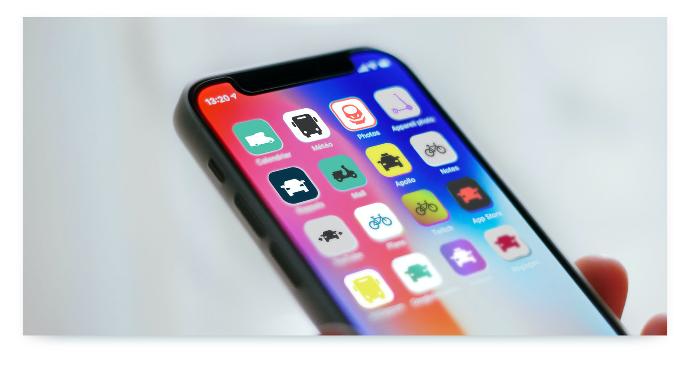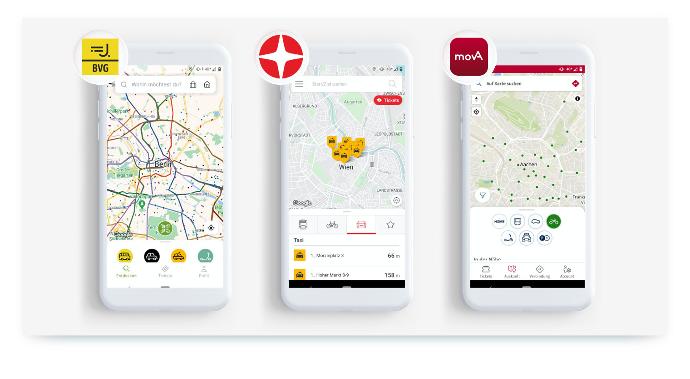In the past decades, sharing providers were primarily concerned with building up and optimizing their own offering in order to be considered as a relevant mobility option. In the meantime, they are looking beyond their own business model and need to appear visibly alongside the local mobility players. An important element here are so-called aggregator apps: Apps that digitally map the diversity of local mobility and make it easy for users to get to their destination quickly and conveniently.
Part 1: The Market Situation
Twenty years ago, anyone who needed to get from A to B had a choice (depending on where they lived) between their own car or bicycle, bus, train, cab or, for short distances, walking. Today, these options are joined by other mobility services such as carsharing, bikesharing, ride sharing, ride hailing... . Not only is the variety of mobility services growing, but so is the number of providers - and no longer just in large cities and metropolitan regions.
Mobility is therefore becoming increasingly complex and multi-layered. As a user, the questions arise: How do I find the ideal means of transportation? How do I know how to get from A to B the fastest, cheapest or easiest way? Where do I book a particular mobility service?
In a market where a multitude of services exist side by side, users have to conduct extensive research to be able to answer these questions. In addition, they have to register with all the services that come into consideration and possibly download an app. This takes time and sometimes leads to customers sticking with the services they already know and use.

Part 2: The Goal
In addition to optimizing their own services, providers must also consider how they can network with different local mobility options to meet the needs of users and facilitate multimodal mobility. After all, what counts for them in the end is how comfortable they are on the road.
In concrete terms, platforms or apps are currently being developed in many cities that can be used to calculate routes including travel time, view timetables including real-time information, and make bookings. Such a solution makes it easier for users to select the most suitable service from the range of offers. The threshold for trying out a new offer is lowered if they do not have to register again for each service.
Ultimately, the overview is a digital representation of the mobility market on the ground. As a provider, you should pursue the goal of positioning yourself there with your business model. In addition to the effects on user satisfaction, you gain access to an expanded potential target group - people who may not yet have been aware of your offering and thus become aware of it.
In many cases, a Mobility-as-a-Service platform is operated by the local public transport provider. However, neutral operators are also conceivable. The advantage of local public transport operators is that they are already strongly associated with local mobility and the offering is therefore quickly popular. They also have a public mandate, so the municipality can use the platform to pursue its own goals and interests toward more sustainable transportation.

Part 3: The Path of Implementation
A specific form of mobility-as-a-service (MaaS) platform is an aggregator app that offers various mobility services. What distinguishes this from map services such as Google Maps is that users can not only find different offers, but also book and use them in full. To do this, they register only once with the aggregator (and not individually with each offer, as in the initial situation).
This is made possible by the Aggregator API. An API is an interface that can connect an external software system to your own program. Using this interface to your sharing system (such as the MOQO platform), aggregators can integrate their sharing offers into an aggregator app. The API is used to retrieve vehicle and availability information, start bookings, and open vehicles.
Linking external tools and systems to MOQO via APIs →
In addition, the API allows you to automatically generate user accounts on your sharing platform. The account information is based on the existing account in the aggregator app. Users themselves have no touch points with the account on your platform, but interact exclusively with the aggregator app.
As a rule, only the aggregators have a direct business relationship with the end customers. The mobility provider provides the mobility and has a direct relationship with the aggregator - but not with the users.
What use case does the Aggregator API serve?
1. The MaaS platform purchases mobility from a provider.
2. The MaaS platform sells mobility in its own name and on its own account to end customers.
Other use cases are enabled through alternative APIs.
MOQO as a door opener
Offers based on the MOQO sharing platform can be integrated into other apps via the described aggregator API. Providers who make their vehicles available via MOQO can thus make their offer visible in local mobility apps.
The user data from the aggregator apps is automatically transferred via single sign-on when it is forwarded to the sharing app provided by MOQO. This means that bookings and trips continue to be made in the familiar system without users having to register again.

Part 4: Existing Examples of Mobility-as-a-service Apps
Below we present some examples where the API is already in use.
movA in Aachen
movA collects the mobility offers in Aachen. The app is operated by the Aachen transport company ASEAG. In order to be able to make bookings and payments in addition to the timetable information, users must be at least 18 years old. Even cab rides can then be booked via the app. Tickets for buses and trains in the Aachen Transport Association (AVV) are available in the ticket store. The driver's license check, which is required for carsharing services, is also carried out via the MovA app or rather an integrated service.
Customers get access to various mobility services of the city - and only pay for the services they actually use. There are no registration or basic fees for movA.
Integrated MOQO partner: Velocity
Velocity operates a station-based e-bike sharing service in Aachen. In addition to the Velocity app, the bikes can also be used via the movA app. Since December 2021, Velocity has already gained nearly 55,000 riders via movA and sold nearly 10,000 rides.
Jelbi in Berlin
Jelbi is not only the name of Berlin's mobility app, but also of the mobility stations distributed throughout the city. Both are operated by Berliner Verkehrsbetriebe (BVG). In the app, users can see all means of transportation as well as stops and stations in the vicinity and get the route to a desired destination, including the possible vehicles. If there is a suitable vehicle, they can make a booking directly in the app.
Similar to movA in Aachen, users must register with Jelbi and confirm their identity and driver's license before booking. However, only the partners that a user actually uses receive the personal data required for the trip.
Integrated MOQO partner: mobileeee
mobileeee offers pure e-carsharing, mainly in rural regions and outlying areas of major cities. Jelbi customers can book and pay for the station-based electric cars directly via the Jelbi app. Almost 2,000 bookings have already been made in this way.
WienMobil in Vienna
The WienMobil app is operated by Wiener Linien, the public transport company of the Austrian capital Vienna. They also operate the associated WienMobil stations. WienMobil combines public transport, sharing offers and cab rides. Users receive route information and can view timetables in real time.
After registration and - for carsharing offers - successful validation of the driver's license, it is possible to create bookings.
Integrated MOQO partner: sharetoo
The provider sharetoo operates the station-based carsharing WienMobil Auto together with Wiener Linien. The vehicles are displayed in the mobility app. If users want to book a car, they are automatically redirected to the sharetoo app. Thanks to single sign-on, they do not have to register again; the required data is forwarded automatically.

Becoming Visible on the Local Mobility Market
Collecting all local mobility offers in one app is the next logical step to bring about a real change in everyday mobility. No single provider can meet all needs on its own, and no user wants to need numerous different apps to filter out the best option on their own.
Joining forces to provide local people with intuitive and seamless transportation not only strengthens the location as a whole, but also each individual provider. You strengthen your visibility, establish yourself as a relevant mobility service provider, and gain access to new customer groups.




